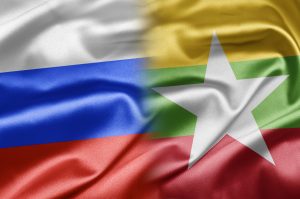The head of Myanmar’s military junta, Senior Gen. Min Aung Hlaing, met today with Russian President Vladimir Putin on the sidelines of an economic meeting in eastern Russia, the first time that the pair have met since last February’s coup d’etat.
According to a report published Tuesday in the state media outlet TASS, Min Aung Hlaing was one of four leaders scheduled to meet with Putin on the sidelines of the Eastern Economic Forum (EEF), an annual meeting aimed at encouraging foreign investment in the Russian Far East, which is being held this week in Vladivostok (theme: “On the Path to a Multipolar World.”)
Min Aung Hlaing arrived in Russia on Sunday to attend the EEF – his third visit to Russia since leading the military coup of February 2021 (and ninth overall) – and to “further cement the cooperation” and “friendly ties” between the two countries’ economies and governments, the Global New Light of Myanmar reported. Somewhat surprisingly, this is the first time he has managed to get in a room with Putin.
The meeting went about as one would expect, with Min Aung Hlaing effusive in his praise for the Russian leader. “With your help, the country is developing intensively,” he said, according to a TASS report. “One can say that when you started to rule the country, Russia moved to a leadership position globally.”
“And we would describe you not just as the leader of Russia, but also as a leader of the world, because you are controlling and organizing stability all over the world,” he added. Somewhat mysteriously, the TASS report concluded with a comment that Min Aung Hlaing said that he had “certain information” to deliver to Putin, without providing any more details.
Putin becomes the most prominent international leader to host Min Aung Hlaing, and also the first who represents a permanent member of the United Nations Security Council, testifying to the swift convergence of interests between the two nations. Relations between Russia and Myanmar were good before the military coup, but the Myanmar coup in February 2021 and the Russian invasion of Ukraine a year later have cemented their partnership.
Russia’s government has provided unstinting support to the military junta’s attempts to crush through force of arms the resistance that has sprung up to challenge its rule. Visiting Myanmar in July, Russian Foreign Minister Lavrov declared that Moscow was “in solidarity with the efforts aimed at stabilizing the situation in the country.”
Similar support has also flowed the other way, with a junta spokesperson describing the Russian invasion of Ukraine as “justified for the sustainability of their country’s sovereignty.” According to a report in The Irrawaddy, presidential aide Yury Ushakov told the press on Monday that Russia and Myanmar’s positions on key international and regional issues “are either close or identical,” as the paper put it. Myanmar’s military administration understands the causes of “the special military operation in Ukraine,” Ushakov said, views it as “well-grounded,” and “rejects the West’s anti-Russian sanctions.”
With the war in Ukraine likely to spill over into the winter, and no end in sight for the Myanmar military’s zero-sum struggle against the country’s polycentric resistance movement, there is no reason to think that this Russo-Burmese convergence will end any time soon. Indeed, there is every indication that as Western nations tighten their sanctions on both countries, it will spread into new areas of cooperation.
In a separate agreement signed in Vladivostok today, Myanmar and Russian officials signed a roadmap for cooperation on the peaceful use of nuclear energy, including the “possibility of implementing a small modular reactors project in Myanmar.”
Min Aung Hlaing also told Russian state media that Myanmar has begun buying petroleum products from Russia and is expecting its first delivery of diesel fuel in the coming days. He added that Naypyidaw was ready to pay for supplies in Russian rubles. “Whatever currency the Russian side accepts, that’s what we’ll pay. This makes it much easier for us because there are a lot of restrictions on receiving and transferring in other currencies,” Min Aung Hlaing said.

































